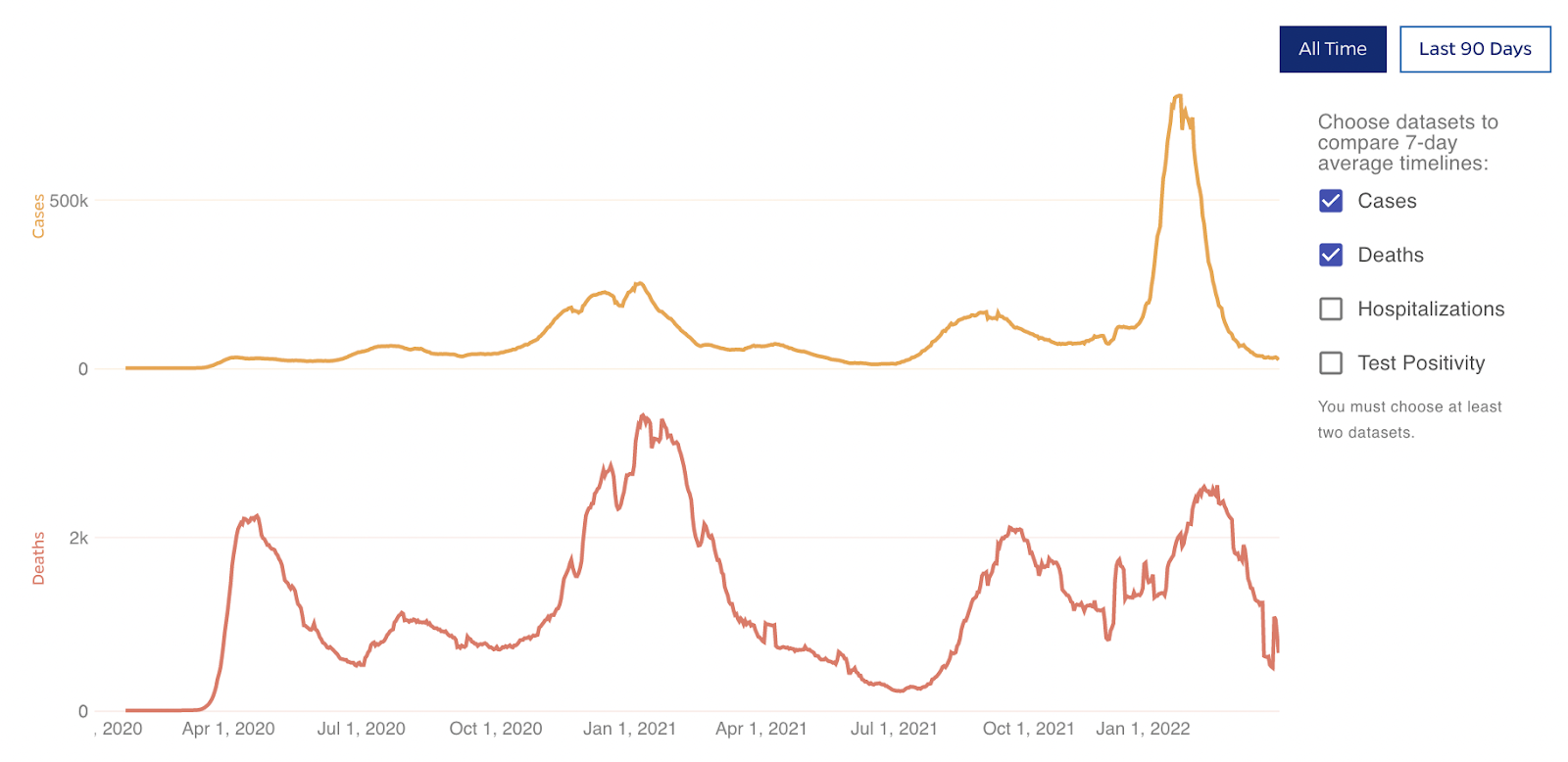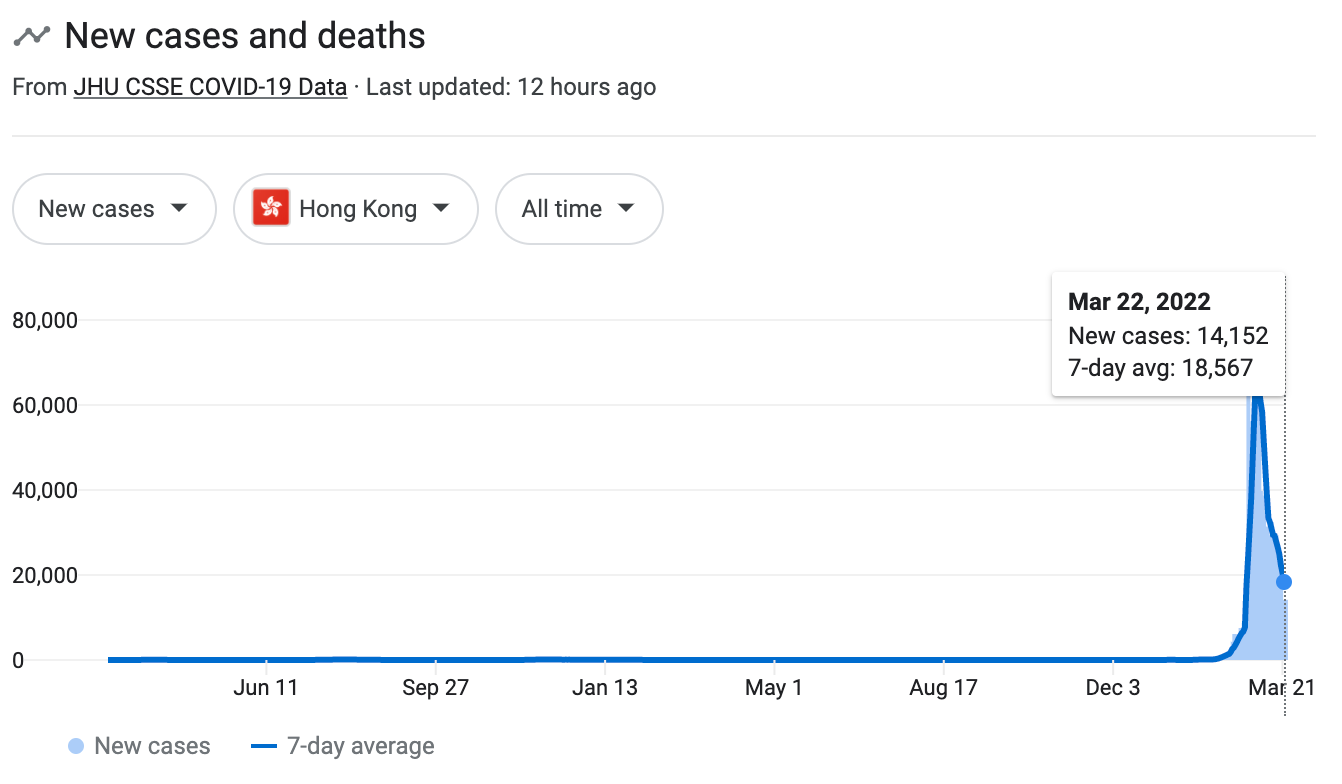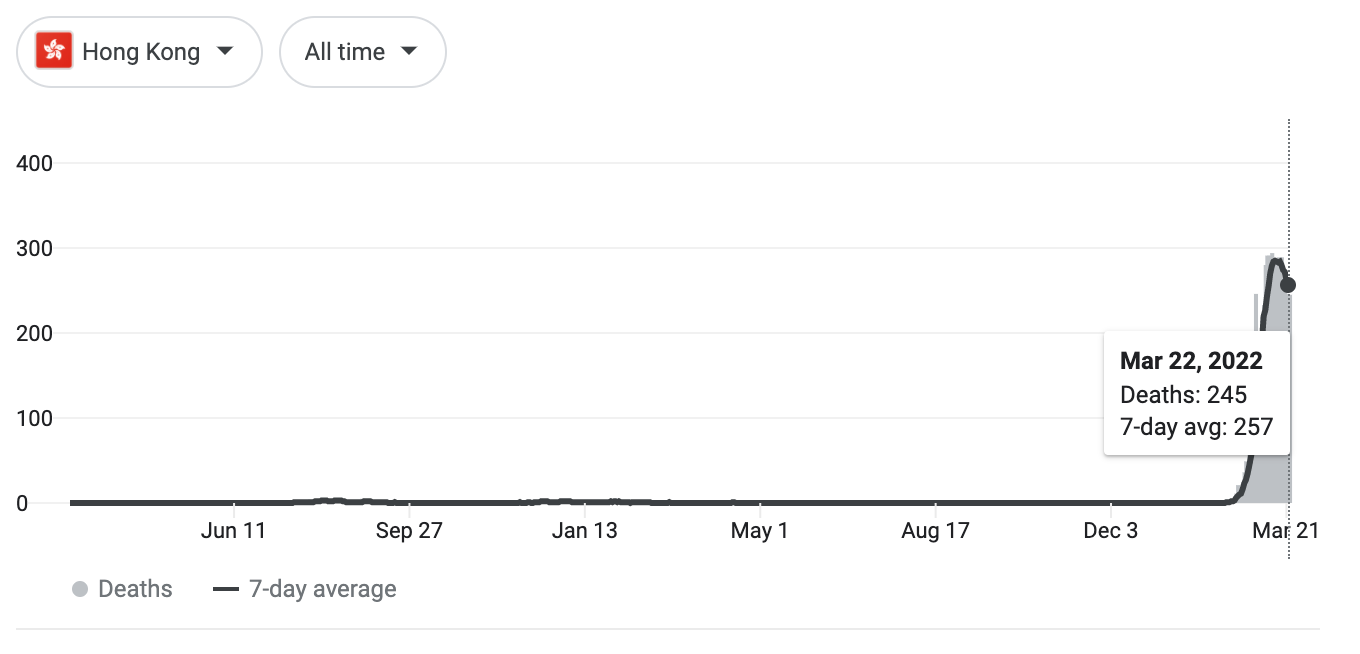Happy Wednesday! Over the past decade, the Green Bay Packers have won the NFC North eight times; the Chicago Bears have won it just once. (What does this have to do with anything, you ask? Nada. But Declan is off again today, so we’re taking our shots while we have the opportunity. Plus, it’s a good way to see if he’s reading TMD even on vacation.)
Quick Hits: Today’s Top Stories
Supreme Court nominee Judge Ketanji Brown Jackson faced aggressive questioning Tuesday from Republicans on the Senate Judiciary Committee on the second day of her confirmation hearings. Brown parried many of those questions emphasizing a limited role for the judiciary and the impartiality of judges. “My north star is the consideration of the proper role of a judge in our constitutional scheme. Judges should not be speaking to political issues,” Jackson said. The hearings are scheduled to resume this morning at 9:00 a.m.
President Biden is expected to announce more sanctions against Russia on Thursday. Biden travels to Europe today, and he will have meetings with officials from NATO, the EU and the G-7 in Brussels on Thursday, after which he’ll announce sanctions, according to the Washington Post. On Friday, Biden will travel to Poland.
Ukrainian President Volodymyr Zelensky pressed the Italian government to seize a yacht—the Scheherazade—widely believed to be owned by Vladimir Putin. Speaking to the Italian parliament Tuesday, Zelensky urged the country’s leaders to be more aggressive in seizing assets of Russian leaders and oligarchs. "Don't be a resort for murderers. Block all their real estate, accounts and yachts—from the Scheherazade to the smallest ones," Zelensky said. An investigation released Monday by journalists working for jailed Russian opposition leader Alexei Navalny provided detailed evidence of the yacht’s connections to Russian intelligence services and Putin.
On Tuesday, Navalny was sentenced to nine years in prison in a Moscow courtroom on trumped up charges of embezzlement and contempt. Navalny, who continues to speak out against Vladimir Putin and his corrupt regime, responded in a thread on Twitter, writing: “Words have power, Putin is afraid of the truth.”
Top Democrats shared a draft plan for the 2024 presidential primaries Tuesday that could end Iowa’s prominent early role in deciding the party’s nominee. The new proposal establishes criteria—including racial and ethnic diversity and a state’s competitiveness in general elections—friendlier to other prospective early states, according to reporting in the Washington Post.
Utah Republican Gov. Spencer Cox vetoed a bill that outright bans transgender athletes from competing in girls sports in the state. Utah state Sen. J. Stuart Adams released a statement saying Republicans would override the veto.
A powerful tornado touched down in New Orleans Tuesday evening, leaving a path of damage and destruction in its wake. Emergency crews worked through the night to find victims of the storm.
Is COVID Over?

It was a little more than two years ago that Americans first saw the signs of how seriously COVID-19 would disrupt their lives. In March 2020, the NCAA canceled its men’s and women’s basketball tournaments. Major League Baseball suspended spring training and the beginning of its regular season. Churches shut their doors to public worship.
In March 2021—after a long year of shutdowns, mitigation efforts, and painful public health outcomes—things started to get back to normal, sort of. We did get March Madness, but teams played in mostly empty gyms. The glitzy Academy Awards took place but with a small, socially distanced crowd. More worshippers attended Easter services, but often with seating only in every other pew.
Now, in March 2022, stadiums, churches, bars, restaurants—and everything in between—seem to have shed the last vestiges of mask and vaccine mandates and are filling to capacity even in some of the most COVID-conscientious cities in the country.
For two years, Washington, D.C., has had some of the strictest COVID protocols in the U.S. Yet Mayor Muriel Bowser surprised folks last month when she ended the district-wide indoor vaccine mandate for private businesses. In New York City, Mayor Eric Adams announced Tuesday the city would finally end the school mask mandate for children under 5 years old.
COVID-19 no longer dominates the headlines as it once did. Americans who communicated using the technical jargon of epidemiologists are back to talking about the more mundane aspects of day-to-day life. Workers are gradually increasing their days in the office. Restaurant visits feel distinctly less adventurous. Smiles are visible once more (scowls, too), The obvious questions: Are we finally done? Is something close to “normal” imminent?
The realistic answer: Not quite.
Dr. Monica Gandhi, an infectious disease specialist at the University of California San Francisco, said rather than thinking about the pandemic as “over,” it’s important to realize: “We have the tools now to manage the pandemic—in the scientific community—without having the public make further sacrifices.” In an interview with The Dispatch, Johns Hopkins University public health professor Chris Beyrer calls what we’re experiencing now an “epidemiological lull.”
COVID-19 isn’t done, but that doesn’t mean the U.S. will go back to the radical disruptions of one or two years ago.
On a Twitter Spaces event hosted by the New York Times, Harvard University associate professor Bill Hanage said the answer to the question isn’t one science can answer: “The answer is one of values, not one of science because unfortunately, the only way a pandemic ends cleanly is if the virus gets completely eradicated. And I can tell you how many times we’ve seen that in the past: never.” He continued, “So it’s going to be around in some form or other and it’s going to continue to transmit, and that's going to come with some costs. The question is how best we can mitigate them.”
Governments will probably be less likely to make sweeping decisions affecting whole populations even as we live with COVID-19. Earlier this month, Hawaii became the final state to announce an end to its indoor mask mandate (effective Friday).
The shift in the politics of COVID-19 has been swift. Democratic governors moved quickly last month to deconstruct the various mitigation measures they’d long advocated. Today, it’s hard to find elected officials of either major party pushing even partial lockdowns or qualified mask mandates. "I'm completely over mask mandates," Rep. Sean Maloney, a New York Democrat who runs the Democratic Congressional Campaign Committee, told Axios. "I don't think they make any sense anymore. I'm for whatever gets rid of mask mandates as quickly as possible."
How a new variant or spikes in cases affect Americans’ attitudes—and attention spans—remains to be seen. But COVID-fatigue has definitely set in.
Last week, public concern over COVID hit an all-time low, according to Morning Consult. Just 17 percent of all adults said they considered the coronavirus a “severe” risk in their community. According to the same report, 67 percent of remote workers said they’d feel comfortable returning to the office, 73 percent are comfortable eating out at restaurants, and the number of Americans masking up when they go out continues to drop.
“In the U.S., at this point it is going to be much more of an individual and a family-based decision—how to handle this—and it’s going to be very dependent on each family’s issues,” Beyrer told The Dispatch. That’s especially true for the elderly and the immunocompromised.
So what may come next? Omicron brought the biggest spike in new cases in the U.S. in the entire pandemic, even though deaths never approached the levels of winter of 2021 during the Delta wave.

“I think another variant is likely,” Dr. Gandhi says. “I think there are key differences now than before that will protect us against another variant.” Today we have tools—such as vaccines to prevent serious infection and treatments for those who do contract COVID—to manage the situation.
“The only way a new variant of concern could really get a hold and explode in the way that Delta and Omicron did is if it has more ability to evade existing immunities, and that would both be vaccine-induced immunity and natural immunity,” Beyrer said.
A new strain, called BA.2 (a subvariant of the Omicron strain) is now sweeping across Europe and Asia. Europe has typically seen an uptick in cases about three weeks before the U.S. If that remains true, this strain will accelerate infections here. We’re not seeing those numbers spike yet, but BA.2 has made the jump to our side of the pond. According to the Centers for Disease Control and Prevention, it comprises almost 35 percent of COVID-19 infections in the U.S. right now.
There’s good news and bad news with BA.2. The bad news, according to a recent study in Great Britain, is that it is more contagious than the original Omicron variant. So BA.2 will likely become the dominant strain wherever it is detected. The good news, though, is that according to the same study, the risk of hospitalization is no greater than with Omicron and only a small number of people infected by Omicron will be infected by BA.2.
Beyrer told The Dispatch the same: “The good news is that people who are fully vaccinated and boosted with high efficacy vaccines … have very low rates of hospitalizations, very low rates of needing intensive care. So that’s really encouraging.”
Vaccines’ ability to prevent serious illness is on display right now in Hong Kong, which is seeing spikes in new infections, hospitalizations, and deaths, after adhering to a “zero COVID” policy—aggressive lockdown and containment measures that aim to prevent any infections in an area from leaking out, rather than trying to live with the virus—for most of the pandemic. The policy had helped Hong Kong maintain an extremely low case and death rate for the past two years, but with the increasing transmissibility of the disease the region is seeing shortcomings of “zero COVID.”


While many adults in Hong Kong did get the vaccine, a large portion of the elderly did not. Because of that and the contagiousness of Omicron and its strains, including BA.2, deaths have skyrocketed.
“If you are elderly or frail and unvaccinated or unboosted, it (BA.2) can still cause serious disease and death. And the reason that Hong Kong is so overwhelmed with illnesses right now and real sickness is because they have not had high vaccine uptick and boosting in people over 70,” Dr. Beyrer said. “Part of what happens with ‘zero-COVID’ policies is that you don't do the hard work of getting everybody immunized.”
SCOTUS Hearing, Day Two
The second day of confirmation hearings for Ketanji Brown Jackson ran until roughly 10 p.m. Tuesday, with Republican and Democratic senators taking turns interrogating the nominee with questions that ranged widely in both friendliness and seriousness. Harvest reported on the hearings once again:
In contrast to a staid first day of opening statements, day two unfolded in a more dynamic fashion. Republicans tried to nail down Jackson on a variety of hot button issues and, like past nominees, she tried to sidestep their more specific queries. One example: When asked whether the number of seats on the Supreme Court should be expanded, Jackson noted that Justice Amy Coney Barrett had refused to weigh in on the question. “My north star is the consideration of the proper role of a judge in our constitutional scheme. Judges should not be speaking to political issues,” Jackson said.
The hours wore on, featuring plenty of political theatrics as lawmakers made the most of their televised exchanges. Due to breaks for Senate floor votes and meals, day two of the hearing lasted until just past 10 p.m.
On defense, Democrats used their time to try to preempt and respond to Republican criticisms. As an opener, Senate Judiciary Chairman Dick Durbin used his 30 minutes to give Jackson a chance to respond to GOP accusations from Monday that her sentences in some child porn cases were too lenient. The attempt did little to keep multiple Republicans from raising the issue throughout the day.
Other Democrats focused on highlighting the historic moment, noting that Jackson would be the first black woman confirmed to the high court. They also lobbed Jackson plenty of softball questions, asking about her background and family…
On offense, Republicans’ approaches varied: Some focused on cultural war concerns, such as asking about the nominee’s views on critical race theory—something she said “doesn’t come up in my work as a judge”—and abortion—she said Roe vs. Wade and Casey v. Planned Parenthood are settled law and ducked questions on when life begins or when equal rights under the law attach to a person.
Others raised questions about Jackson’s time as a public defender, which included representing Guantanamo Bay detainees (her response was that lawyers don’t pick who they defend). The most sensitive topic involved Jackson’s sentencing involving cases of child pornography. Wonkier lines of questioning sought to pin down Jackson’s judicial philosophy.
At times, civility wore thin.
Both Republican Sens. Josh Hawley of Missouri and Ted Cruz of Texas pressed Jackson at length about her record of sentencing in child pornography cases during her time as a district court judge.
Jackson described such crimes as “egregious” and said that her sentencing as a judge was guided by Congress’ requirement to impose a punishment “sufficient but not greater than necessary.”
Hawley homed in on a particular case in which Jackson sentenced an 18-year-old male in possession of child pornography to three months in federal prison.
Why, he demanded, did Jackson only sentence him to three months?
“It is heinous. It is egregious,” she said. “It’s not just about how much time a person spends in prison. It’s about understanding the harm of this behavior.”
Jackson defended her approach as in the mainstream, and said that if he looked at the “greater body” of her rulings, as well as those by other judges “you would see a very similar exercise of attempting to do what it is that judges do—attempting to take into account all of the relevant factors and do justice individually in each case.”
Read the rest of Harvest’s piece for the website here.
Worth Your Time
It is the central question in world events right now: What is Vladimir Putin doing and why is he doing it? Dr. Jane Burbank, a professor of Russian history recently retired from New York University, offers a straightforward explanation in the New York Times: Empire. “A revitalized theory of Eurasian empire informs Mr. Putin’s every move. The end of the Soviet Union disoriented Russia’s elites, stripping away their special status in a huge Communist empire. What was to be done? For some, the answer was just to make money, the capitalist way. In the wild years after 1991, many were able to amass enormous fortunes in cahoots with an indulgent regime. But for others who had set their goals in Soviet conditions, wealth and a vibrant consumer economy were not enough. Post-imperial egos felt the loss of Russia’s status and significance keenly.”
A German man incapable of movement or speech after his affliction with ALS is able to communicate using messages transmitted by recording the electrical activity of brain cells. “A completely paralyzed man has been able to communicate entire sentences using a device that records his brain activity,” reports Jessica Hamzelou for the MIT Technology Review. “The man was able to train his mind to use the device, which was implanted in his brain, to ask for massages, soup, and beer, and to watch films with his son. It is the first time a completely locked-in person—someone who is conscious and cognitively able but completely paralyzed— has been able to communicate in this way, say the researchers behind the work. Brain-computer interfaces record the electrical signals inside a person’s brain and convert them to commands that control a device. In recent years, BCIs have enabled partially paralyzed people to control prosthetic limbs or communicate a simple ‘yes’ or ‘no’ by thought alone. But this is the first time someone who is completely locked in, and unable even to control their eye movements, has used a BCI to communicate full sentences.”
Presented Without Comment
Also Presented Without Comment
Toeing the Company Line
In the latest Uphill, Haley talks to former GOP Rep. Will Hurd of Texas about his new book American Reboot: An Idealist’s Guide to Getting Big Things Done. While Hurd “is acting like a man who wants to run for president,” Haley writes, his book is better than the campaign schlock turned out by typical presidential aspirants.
David takes stock of Russia’s invasion of Ukraine after nearly a month. Writing in The French Press, he argues that “Russia’s advance has largely stalled” but “it’s an open question whether [Putin] can inflict so much damage on Ukraine that he can snatch a degree of victory from the jaws of his early humiliating defeat.”
In an explainer on leadership political action committee’s in this week’s Sweep, Sarah agrees with Donald Trump’s assertion that some of the campaign laws around PACs are “unbelievably stupid.”
On Monday, the pro-Kremlin tabloid Komsomolskaya Pravda published a report saying that 9,861 Russian troops have died in Ukraine. The tabloid deleted the post, replaced it with one that didn’t include the figures, and claimed it was hacked. Andrew Fink runs through various possibilities as to what happened, then dives into the question of just how many Russian soldiers have actually died.
Jeryl Bier writes about the challenges faced by the Countermeasures Injury Compensation Program, which was set up in 2007 “to provide compensation for those injured or killed by health measures administered in response to an epidemic or other threat to national health or security.” Its workload has increased 11,000 percent because of the pandemic, but its staffing levels have barely budged.
Let Us Know
How often over the past week have you engaged in a conversation primarily about COVID-19, if at all? How often did you have a substantive conversation about the pandemic this week one year ago? And in late March 2020?
Reporting by Ryan Brown (@RyanP_Brown), Harvest Prude (@harvestprude), and Steve Hayes (@stephenfhayes).







Please note that we at The Dispatch hold ourselves, our work, and our commenters to a higher standard than other places on the internet. We welcome comments that foster genuine debate or discussion—including comments critical of us or our work—but responses that include ad hominem attacks on fellow Dispatch members or are intended to stoke fear and anger may be moderated.
With your membership, you only have the ability to comment on The Morning Dispatch articles. Consider upgrading to join the conversation everywhere.